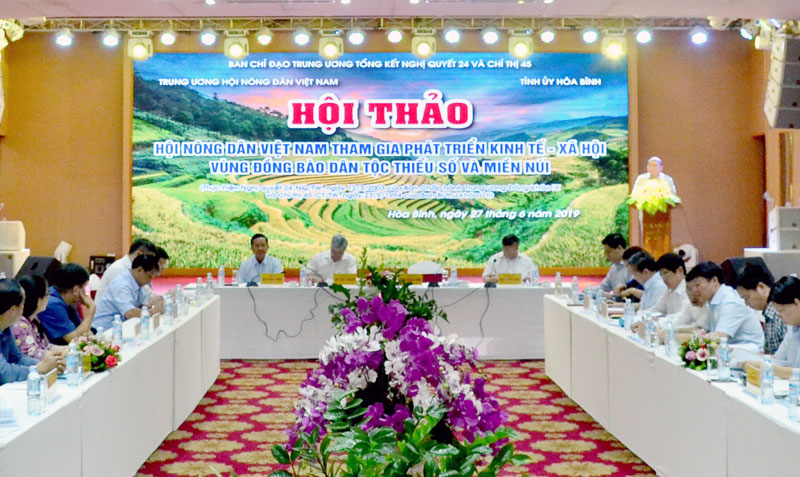
(HBO) – The Vietnam Farmer’s Union on June 27 partnered with Hoa Binh province’s Party’s Committee to host a workshop on how the union contributes to socio-economic development in mountainous areas and areas where ethnic minority communities live.
Present
at the workshop were Party Central Committee member and President of the
Vietnam Farmer’s Union Thao Xuan Sung; Party Central Committee member and Minister-Chairman
of the Committee for Ethnic Minority Affairs Do Van Chien; and Party Central
Committee member and Secretary of the provincial Party’s Committee Bui Van Tinh,
along with delegates from 21 provinces.
 An overview of the
workshop.
An overview of the
workshop.
The
event provided an opportunity for the central government and cities and
provinces to review socio-economic development in mountainous areas and areas
of ethnic minority groups over the past years. At the same time, delegates
shared experiences and challenges in fulfilling tasks in each locality and how
they can work together to develop these areas in the following years.
After
the 15-year implementation of Resolution No.24, dated March 12, 2003, issued by
the 9th Party Central Committee and the 25-year implementation of
Directive No.45, dated September 23, 1994, of the 7th Party Central
Committee’s Secretariat, infrastructure in mountainous and ethnic minority
people areas have been more developed. The education, healthcare and cultural
services in those areas have also seen progress, improving the ethnic minority
groups’ living standard.
As
of the end of 2018, the poverty rate among ethnic minority households declined
by over 3 percent from the previous year to 25.5 percent. At the same time, the
infrastructure have been significantly improved as 98.6 percent of the communes
have concrete roads leading to communal People’s Committees’ offices and 99.8
percent of the communes and 95.5 percent of the villages have access to electricity.
To
fulfill its tasks in socio-economic development in mountainous and ethnic
minority people areas, the Vietnam Farmer’s Union
has built more than 10,500 demonstration models in VietGAP-based horticulture,
husbandry and aquaculture alongside over 170,000 models of production combining
with distribution in a value chain.
At
the workshop, the delegates made recommendations to more effectively implement
socio-economic development policies in mountainous and ethnic minority people
areas in the north and to help the union scale up projects which encourage
farmers in H’mong ethnic minority villages to engage in tourism.
Hoa Binh province is undergoing a dynamic transformation amid Vietnam’s national digital transition. Building on Poliburo’s Resolution No. 57-NQ/TW on breakthroughs in science, technology, innovation, and national digital transformation, the province has rolled out a wide range of practical action plans. A standout initiative is the "Digital Literacy for All” movement, an effort to ensure that no one is left behind in the digital era.
Hoa Binh province is undergoing a dynamic transformation in the wake of the national digital transformation movement. Building on Resolution No. 57-NQ/TW of the Politburo on breakthroughs in science, technology, innovation, and national digital transformation, the province has implemented a wide range of practical action plans. A standout initiative is the "Digital Literacy for All” movement ambitious effort to ensure that no one is left behind in the digital age.
With a spirit of unity and proactive problem-solving, the Party Committee, the government and the people of Dong Lai Commune (Tan Lac District) have made great strides in implementing the resolutions of the 24th Party Congress of the commune for the 2020 - 2025 term. Focusing on leadership and practical actions, the commune has brought the Party’s resolutions into daily life, creating strong impacts and pushing the local development forward.
Amid the nationwide push for digital transformation, young people in Hoa Binh Province are stepping up as dynamic pioneers, applying technology to enhance Youth Union operations and expand the reach of youth-led initiatives. Through creativity and adaptability, Youth Union organizations at all levels have introduced a series of practical solutions, contributing to modern governance and community development.
In recent years, An Nghia commune, located in Lac Son district, has stepped up administrative reform, focusing on improving the quality and efficiency of its single-window service unit for receiving and processing administrative procedures. These improvements have helped create favourable conditions for local residents and organisations to handle administrative procedures, contributing to the commune’s broader socio-economic development.
The Prime Minister-approved master plan to develop the multi-use value of forests ecosystems through 2030, with a vision to 2050, aims to improve the management and sustainable use of forest resources, create jobs, increase incomes, and improve the living standards of ethnic minorities, people in mountainous and remote areas, forest workers and those living near forests.



 An overview of the
workshop.
An overview of the
workshop.